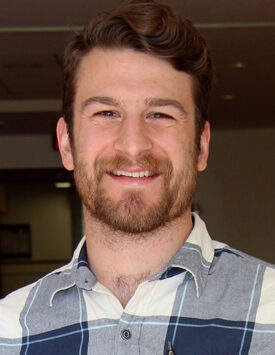Dr. Carl Wepking
PHD FELLOW GRADUATE | Global Change Center
VT Graduate August 2018, Biological Sciences
Advisor: Dr. Michael Strickland
Google Scholar • wepking@vt.edu

Dr. Carl Wepking defended his Ph.D dissertation in August of 2018 under the mentorship of Dr. Michael Strickland. He is now a Program Manager at University of Wisconsin’s Dept. of Agronomy and Assistant Scientist at the Great Lakes Bioenergy Research Center. Carl served as Executive Director of the Global Soil Biodiversity Initiative based out of the School of Global Environmental Sustainability at Colorado State University from 2018-2020. As an ecologist, his research has been primarily focused on soil and microbial ecology, soil biodiversity and the ecosystem services provided by the life in soil and researching how human activities effect soils and their associated functioning, both positively and negatively. Particularly, his research has focused on the unintended consequences of livestock antibiotics and affect these antibiotics can have on soil microbes and the functions they regulate.
Carl obtained his bachelors degree in Environmental Science from St. Norbert College in De Pere, Wisconsin, where he completed a thesis on nematode biodiversity in neotropical forest soils in the Gamboa region of Panama. He went on to work as an intern and technician at the Dauphin Island Sea Lab in Dauphin Island, Alabama. He was involved with a variety of aquatic ecology research projects including oyster reef and seagrass bed restoration, as well as ichthyoplankton oceanography and ecology. At Washington State University, Carl completed his master’s degree in Environmental Science. His thesis research was on larval fish ecology and potential prey availability in a Pacific estuary. He aided investigations of invasive species range expansion for two species, the rusty crayfish (Orconectes rusticus) and the calanoid copepod, Pseudodiaptomus forbesi, and helped with projects pertaining to endangered species habitat restoration following levee removal.
For his PhD thesis, Carl investigated the effects antibiotic use in agricultural livestock rearing has on soil ecosystems, specifically in terms of microbial community function. Additionally, he worked to expand the project to include more trophic levels of the soil community in order to better understand how antibiotic perturbations can affect secondary and tertiary trophic levels. Questions regarding soil and agricultural ecology are of particular interest to Carl, as he grew up working with his family’s cattle farm in Wisconsin.
Last updated June 2022.




